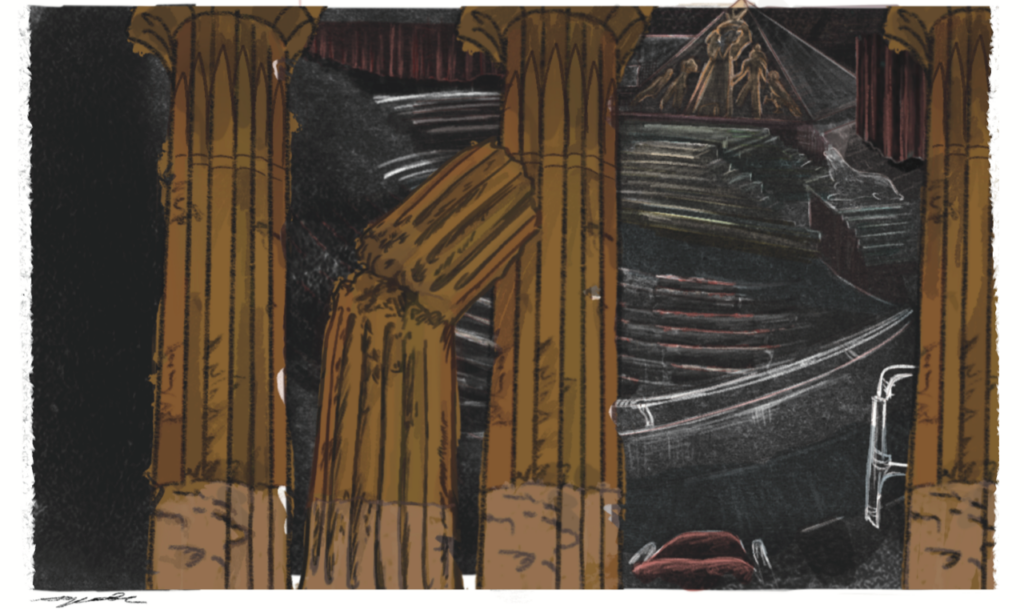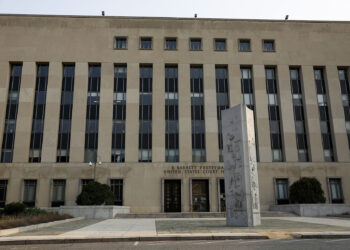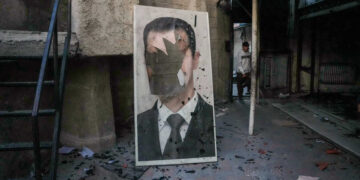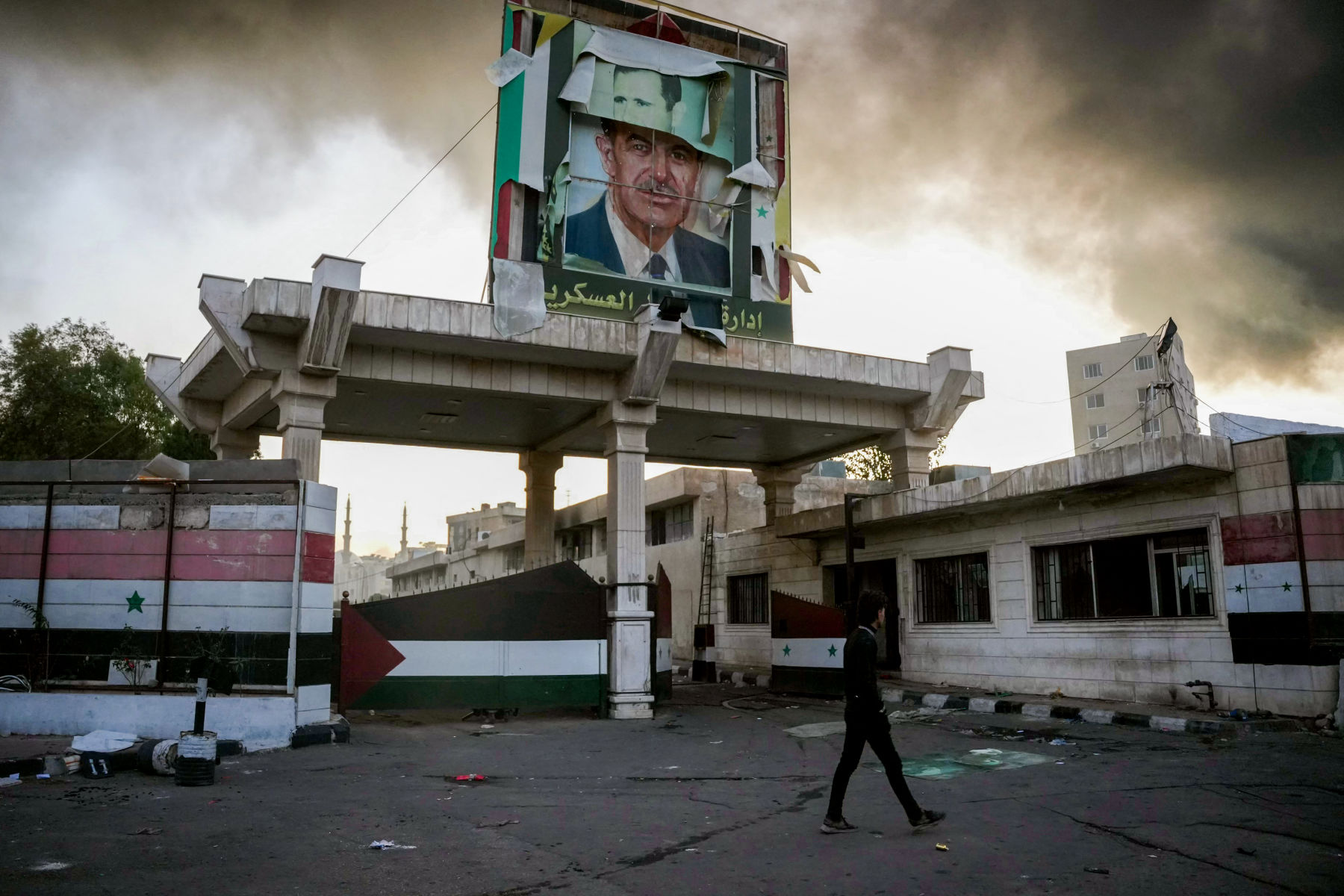Omid Memarian, a journalist, analyst and recipient of Human Rights Watch's Human Rights Defender Award, is the Director of Communications at DAWN.
عربي
Negotiations between Iran and world powers in Vienna to revive the 2015 nuclear deal are entering a "final phase," Germany's foreign minister said Thursday during a visit to Israel, as more signs point to the agreement's potential restoration after talks began last spring. Despite Israel's open objections to any diplomatic efforts to salvage the nuclear accord, led by the Biden administration, a breakthrough may finally be on the horizon.
It comes as Iran is marking the 43rd anniversary of its Islamic revolution. On Feb. 1, 1979, exiled cleric Ayatollah Ruhollah Khomeini returned to Iran amid widespread protests against the Shah. Ten days later, on Feb. 11, the Shah's government completely collapsed. Ever since then, Iran has had a tumultuous relationship with Saudi Arabia, which became its biggest regional rival following the Islamic revolution. Yet over the past year, alongside the nuclear talks in Vienna, Iran has also pursued another foreign policy objective: de-escalating tensions with Saudi Arabia.
Where could this diplomacy lead, and why are leaders in Tehran and Riyadh interested in talking now after so many years of hostility?
"Both countries, Saudi Arabia and Iran, recognize that this is a different landscape than it was a few years ago. They're trying to gingerly walk their way to a new modus of less confrontation," says Iran scholar Abbas Milani, a professor at Stanford. "Both of them are trying to find a new place for themselves in this new Middle East." Iranian leaders since 1979 have "created a rhetorical prison house for themselves," he explains, with their fierce opposition to the United States and its regional allies, especially Israel, and a hard-line foreign policy based on what he calls "their own sectarian view of the world"—which has in turn been mirrored by Saudi Arabia for decades.
Milani is the Hamid and Christina Moghadam Director of Iranian Studies at Stanford, and also a research fellow and codirector of the Iran Democracy Project at the Hoover Institution. He is the author of many books, including The Shah and The Persian Sphinx: Amir Abbas Hoveyda and the Riddle of the Iranian Revolution, both essential to understanding Iran during the Pahlavi dynasty.
In an extensive interview with Democracy in Exile, Milani discussed whether Saudi Crown Prince Mohammed bin Salman's feverish development plans today mimic those of the Shah in the 1960s and 1970s in Iran; how both Tehran and Riyadh have inflamed Islamic fundamentalism for the past four decades; the importance of engagement between Iranian and Saudi diaspora communities; and why "you can't pick the human rights you suddenly care about."
Long-term stability in the Middle East will only come if all of the people have a stake in what is happening.
- Abbas Milani
The following transcript has been edited lightly for clarity and length.
In an interview in 2017, Crown Prince Mohammed bin Salman essentially blamed Iran for Saudi Arabia's embrace of Wahhabism, stating that the ultra-conservative form of Islam promoted by the kingdom was all a reaction to Iran's Islamic revolution. How much of this claim fits the lived realities in the Middle East post-1979?
I think some of it is true, but in the case of Saudi Arabia, as I think historians would concur, the rise of radical Wahhabism, or the re-emergence of radical Wahhabism in Saudi Arabia, was a result of probably the single biggest hostage-taking in the 20th century, where radical Wahhabis took over the House of God [at the Great Mosque] in Mecca. They had several thousand hostages; eventually, they allowed most of them to leave. Saudi Arabia had to use French paratroopers to go into the Great Mosque and take these Wahhabi radicals out. But in order to go there, in order for non-Muslims to enter Mecca, Saudi authorities needed to give assurances to the Wahhabi muftis that they would curtail all the reforms that in the same interview, MBS refers to.
Saudi Arabia was going through some reforms in the 1960s and 1970s, in some ways parallel to what was happening in Iran. Some of the assurances to the Wahhabis, before they would allow the entrance of paratroopers into Mecca, was more money for their schools and a guarantee that those reforms would be ended. And I think MBS, in a couple of places, he has said that they are trying to take Saudi Arabia back from the Wahhabi takeover. Saudi Arabia has spent billions of dollars in the last 30 to 40 years, toe to toe with the Islamic Republic, for the advancement of the radical Wahhabi iteration of Islam, as Iran has spent billions—much less than Saudi Arabia—in promotion of their radical version of Shiism. There is another version of Islam, both amongst the Sunnis and amongst the Shiites, that doesn't claim to have the absolute truth, that is more tolerant of other minorities, is less insistent on the literal interpretation of their beloved hadiths or of the Quran. But both of these forces, the radical Wahhabists and the radical Shiites, have eclipsed the other versions of Islam by spending so much money in promoting their radical, intolerant iteration of Islam.
The Shah was widely known for his massive social, cultural and economic development projects in Iran, including his extravagant celebration of 2,500 years of the Persian Empire in 1971. Some say that there are similarities between what Saudi Arabia is undertaking today, in terms of the scope and implementation of MBS's plans, to what the Shah of Iran did. Do you see any parallels?
There are some parallels, and there are some differences. The parallels are that MBS seems to think that the definition of progress is to emulate what has happened in the West. So, if the West has an opera house, and you want to show that you are progressive, you spend billions of dollars to create an opera in Saudi Arabia. The same mistake was made in Egypt in the late 19th century—Aida was commissioned for an opera house in Egypt. Progress in Egypt doesn't require an opera house and Aida. I'm glad Aida was composed, but modernity doesn't come with that. Modernity doesn't come with the establishment of an opera house. Modernity does come with freedom. Modernity does come with equality for women. Modernity does come with the right of people to be free in their private lives, to live it as they see fit. And I would be glad to see any of these changes happen, but neither in Iran nor in Saudi Arabia, do they need to follow the Western model exactly. I think part of what was wrong in Iran under the Shah, and part of what is wrong now in Saudi Arabia, is that their "model of progress" is quintessentially Western.
Now, there's one big difference. In Iran, the people who were planning all of this were to a large extent Iranian engineers, Iranian economists—brilliant economists, from Reza Moghaddam to Mehdi Samii. But in Saudi Arabia, virtually the entire process is being planned by McKinsey and the likes. And clearly, McKinsey and the likes lay out a plan that seems to fit their model and seems to fit their profit expectations. In Iran, there was much more organic expertise on such matters. Iran, by the time of the revolution, had a remarkably successful private sector—Iranian entrepreneurs, industrialists. That has not been the case in Saudi Arabia. Saudi Arabia's economy has been dominated by the state, dominated by oil, and the state is essentially the benefactor of society. And if they are now trying to create some industries, it is essentially the top to bottom.

In Iran, from the 1960s, you had a very sophisticated technocratic class, from [banker and economic planner] Abolhassan Ebtehaj to Moghaddam to [architect] Abdol-Aziz Mirza Farmanfarmaian, to industrialists—the list really is long. Khayami by 1975 had created an auto industry in Iran that was competitive with South Korea. Did Saudi Arabia have anything comparable to that? They had a lot more money, and now they're spending it more wisely, but the perception that everything that happened in Iran was top to bottom, to me, is completely wrong. Iran had a lot of movement from below from the constitutional revolution starting in 1905. Women in Iran—not Reza Shah, not Mohammad Reza Shah, not MBS—women activists in Iran in the 1900s were asking for the right to come into the street the way they liked. They were asking to go to school. They were asking for the right to vote. In 1905! So the notion that Reza Shah came from the top and granted women liberty is nonsense. It's in my view an erroneous argument that the ruling elite in Iran have concocted, that some of the royalists have promoted, and some of the leftists have repeated, forgetting that many of these changes and growth began by people, from below. So what is different in the case of Iran and Saudi Arabia is the extent of these grassroots, if you will, efforts to create an industry, efforts to create a secular education system, efforts to create art, a judiciary that is free from the Quran, an effort to create a constitution, and efforts to accept equal right for women. Saudi Arabia still doesn't have a constitution. Iran had a constitution in 1907.
I'm not trying to say that Iran is better than Saudi Arabia. Saudi Arabia right now has accomplished things that Iran hasn't. But in terms of women, Iranian women had the right to go to stadiums in the 1960s; they had fielded teams in the 1960s. I'm glad now that Saudi Arabia is allowing women to go to stadiums, or to drive. But Iranian women were already driving. An Iranian woman born in the 1950s even started its first female-owned taxi cab service. That's how societal this movement was. So, to me, that's one of the differences between these two models.
Is there any lesson to draw from the fate of the Shah? For example, how can Western governments be more vigilant of massive, state-run developments in the Middle East designed to appease Western audiences rather than inclusive, rights-based and participatory societal changes?
I think there is. I think the lesson is that, unless changes and developments are organic to that society, regardless of how much profit they create for McKinsey or for U.S. arms dealers and other companies, it is not going to be long-lasting unless you incorporate civil society, unless you incorporate democratic rights, unless you incorporate religious minorities. You know, in Saudi Arabia, the Shiite minority is persecuted; in Iran, the Sunni minority is persecuted.
These are not, in my view, enduring changes. Unless you bring change with a long-term vision of inclusion, of secularism, of democracy, equality for religious minorities, equality for women, it is not going to last. I don't care how much profit you get from the West. I don't care how many agreements you sign with companies, or with Israel. Long-term stability in the Middle East, I think, will only come if all of the people have a stake in what is happening.
One of the brutal practices that we have seen both from the Islamic Republic and the Saudi government is going after critics beyond their borders, intimidating them, and in some cases eliminating them. Even though MBS tries to distance himself from the Ayatollahs in Tehran, he still uses some of the same tactics that post-revolution Iran has used to crush dissent, both at home and abroad—most notoriously the killing of Jamal Khashoggi in 2018. Do you think the U.S. government has been critical enough of these abuses?
They haven't been. I think, for example, if the Iranian regime had done something like what Saudi Arabia did in the case of Khashoggi—taking someone, trapping them in their consulate, and then chopping them into pieces—clearly if anybody knows anything about Saudi politics, that could not have happened without the approval of MBS. And to allow him to get away with it, with a little slap on the hand as the Trump administration did, was shameful, and I think it sent the wrong message. It allowed the Iranian regime and its likes to say, "Look what Saudi Arabia's done, we have the right to do with our journalists what we want." And they do—look at the persecution of journalists, and women activists in Iran.
To me, [MBS] should have absolutely been forced to pay a much heavier price. He also arrested a number of top businessmen and essentially hustled them for money. How can you be an advocate of free enterprise and think that's acceptable? I know many of those arrested had never paid taxes. I know many of those people, including MBS, have accrued wealth that no one knows where from. If you have enough money to spend $500 million on a phony Mona Lisa, you have a lot of money to throw around. And then to allow the "captains of industry" to be arrested and put in prison and shaken down for money, that doesn't bode well for the future of free enterprise in the country or the region.
I think the moral authority of the U.S. in criticizing other authoritarian misbehavior in the region is seriously compromised when an ally of the United States engages in this kind of egregious violence. I mean, clearly, the Iranian regime is doing a lot of wrong in Yemen. It has a proxy in Yemen. But Saudi Arabia and its allies are fighting a war that is causing hundreds of thousands of children to be without medication, without adequate food. How can the world be silent? If a moral message is to have authority, it has to be consistent. You can't pick and choose the moral injustices that you oppose and keep silent when your friends commit them.
Secretary of State Antony Blinken said that human rights was going to be one of the pillars of American foreign policy for the Biden administration, but we see that they are pursuing many of the same policies that President Trump did. What is the implication of that loss of moral authority when it comes to the double standards the U.S. has applied to Middle Eastern countries, particularly in the last decade? Some might say it really emboldens brutal governments like Iran's, because it can provide ammunition for domestic propaganda.
You know, I read your wonderful interview with my dear colleague, Larry Diamond. What does he talk about, authoritarian encroachment? If there is a democratic deficit—what he thinks is the most serious challenge to democracy now, orchestrated by the likes of China, Russia, Iran, Turkey, and I absolutely agree with him—it is partly because of this loss of moral righteousness. You can't pick the human rights you suddenly care about. The human rights of Palestinians, the human rights of Iranians, the human rights of Yemenis, and Saudis, must be as much valued as the human rights of U.S. citizens or European citizens.
Right now, the Biden administration says human rights is paramount in foreign policy, and I hope it is. But you are negotiating with a regime in Iran that, on a daily basis, is breaching the human rights of its people. Right now, [lawyer] Nasrin Sotoudeh is back in prison; [human rights activist] Narges Mohammadi is imprisoned in solitary confinement. With the number of daily breaches of human rights, how can you continue doing this, tolerating this, in the hope of arriving at yet another [nuclear] agreement that you know the Iranian regime will sooner or later break?
I think part of what was wrong in Iran under the Shah and part of what is wrong now in Saudi Arabia is that their "model of progress" is quintessentially Western.
- Abbas Milani
The argument is that this is within the framework of international security, and you have to deal with human rights issues in a different channel.
I know the argument, but I don't buy the argument.
What do you think about that argument?
I think it's a facile argument. From Condi Rice to Hillary Clinton in the past have said this kind of calculus, that there is a different domain for human rights and for international relations—and it was false and futile. This is playing to the Iranian regime. It's the Iranian regime that says, "Yes, come and talk to me about nuclear, but don't talk to me about human rights, that's my domestic issue." No. Human rights is no longer a domestic issue. Human rights is an international issue, an international security issue. You cannot have long-term security in the world if you have regimes that support terrorism—simple as that. You cannot have long-term security in the world if you have regimes that breach the rights of their citizens on a daily basis. And the notion that this is my culture, and you don't have a right to tell me that I don't have the right to abuse women because my version of Islam allows it, is nonsense. We live in the 21st century. We now have common standards of human rights. And every time a government breaches that and the world keeps silent, the world is both complicit in that breach, and the world loses the moral authority to then say something about the human rights abuses of a regime they don't like, or they find less inconvenient to criticize.
Iran and Saudi Arabia have had a tumultuous relationship over the past four decades. But even after the attack on the Saudi Embassy in Tehran in 2016, leading to Riyadh cutting off diplomatic ties, the two countries have recently started a dialogue. How do you foresee its outcome for both countries? Do you think they could succeed in their goal to normalize relations?
I think both Iran and Saudi Arabia see a new landscape in the Middle East and new realities in the Middle East. They both see that the Middle East is, on an increasing basis, losing its strategic significance for the West and for the United States. It wasn't just Donald Trump that said we should get out of bad wars. Donald Trump said it in a very radical way, in a very sometimes impolitic way. But from the Carter administration on, you can see this gradual decrease in the significance Middle East for the U.S.
Now, it's even more. Oil is no longer of central importance. In a way, the United States has decided that even if Russia and China get a foothold in the Middle East, maybe it's fine. The sensitivity that they used to have to this kind of authoritarian encroachment in a very strategic territory would have been very, very different. So, both countries, Saudi Arabia and Iran, recognize that this is a different landscape than it was a few years ago. And they're trying to gingerly walk their way to a new modus of less confrontation.
I don't see the two of them ever becoming the kind of allies that they were during the Shah's time. Of course, during the Shah period, Iran clearly felt that it had the upper hand. It was the dominant force in the Middle East; some of the other allies of Saudi Arabia, like the United Arab Emirates, weren't even in existence in the early part of the 1960s, for example. But now that landscape has changed. Saudi Arabia itself is a powerhouse and Iran is, I think, in the weakest position that it has been in many, many years, so it can't continue the politics of confrontation. Both of them are trying to find a new place for themselves in this new Middle East, where Saudi Arabia and Israel are close allies.
Do you expect this Saudi-Iran dialogue, and even potential normalization between Saudi Arabia and Iran, to change regional dynamics, like Iran's hostility to Israel and the U.S.?
Iran's foreign policy is driven, as it has been driven for the last 42 years, not by Iran's national interest, but by sectarian politics and sectarian interests. Particularly in the last 34 years, it has been driven by Ali Khamenei's dogmatic views of the West, and his decided effort to make Iran not an ally of the West but an enemy of the West, and an enemy of Israel—and an ally, if not a satellite, of China and Russia. I think that chance [for change] doesn't exist so long as Khamenei is in power, so long as the current group is in power, the ones who run foreign policy based on sectarian interest, not on the national interest of Iran. And even if they do think about national interest, they have already pre-rigged the game by some of the absolutes that they have set. Absolutes that have caused Iran great, great damage—like the notion that we don't directly negotiate with the United States unless we do it secretly. The number of times they have secretly negotiated with the U.S., including Khomeini himself, but then publicly say, "No"—and the cost Iran has ended up paying for that—is remarkable.

There's much more rationalism in Saudi Arabia's foreign policy, and much more realism, than there is in the foreign policy of Khamenei. But the complexity of the situation, in my view, is when you look at Saudi Arabia's relationship with China. China is much closer economically to Saudi Arabia than it is to Iran, and Iran has essentially put the whole country on a platter for China and said, "Come and take it." China knows where its bread is going to be buttered. It has invested a lot more in Saudi Arabia, has signed many more agreements—they've sold Saudi Arabia ballistic missiles. They promised Iran comradery relations, but they sell the missiles to Saudi Arabia. Saudi Arabia is not going to use those missiles against Israel. It won't be using them against China. They are a defense against what it perceives to be the threat from Iran. So, the Saudis have Israel, they have China, they have the United States, they have regional allies—virtually all of them—they're close to getting a bigger foothold in Lebanon. They're very close to bringing Syria into their domain. Iran is left with Hezbollah, and the Hashd al-Sha'bi in Iraq.
If Iran and Saudi Arabia normalize their relationship, even to some extent, what effect do you think it may have on Iran's relationship with those proxies from Iraq to Lebanon?
They have created a rhetorical prison house for themselves. Just read what Khamenei has said about Saudi Arabia, about Israel, the United States, England—virtually everybody except China and Russia. If one Muslim is abused in the West, Khamenei is the first one to speak out—as he should. But there are 1.5 million Chinese Muslims in concentration camps, and Putin has slaughtered tens of thousands of Muslims in Chechnya. Not a word. That's because he has created a kind of rhetorical prison house for himself. "We will never do this. We will never negotiate with the U.S. We will never recognize Israel." The continuous insistence that in 25 years, Israel will no longer be there. That's been going on for 42 years. And Israel is now in a much better position than it was 43 years ago when these guys set out to destroy it. Any rational human being would say, "There's something wrong with our thinking." But these are not rational in that sense. They're rational in their own sense, in their own calculation, in their own sectarian view of the world. Khamenei, I truly believe, thinks that there is a historic turn around the corner where Islam is going to have its flag flown over the White House.
Could the kinds of rapid changes seen in the Persian Gulf economically and politically in recent years impact Iran, because of the disconnect between Iran and Gulf Arab countries?
There is a disconnect diplomatically, but there isn't a disconnect culturally. There's a constant comparison that Iranians engage in, with the life of citizens in the United Arab Emirates, in Qatar and Kuwait, even in Turkey. There is an increasing number of migrations from Iran to these places. There is an active process right now in the United Arab Emirates giving citizenship to Iranians who have engineering degrees, doctors' degrees. So they know, they clearly understand, that there is an appeal there. I don't think the rhetoric of the regime and the constant threats they make are undermining the very serious pressure of those developments. Iran used to have one of the best airlines in the world, Homa [or Iran Air]. Now, every time you see the Qatari airline and Emirati airline being the No. 1 safest and becoming the hub of travel and commerce—those were things that Iran could have been part of. People begin to realize that, if these guys hadn't rented out the Persian Gulf to the Chinese, Iranian fishermen today would be in a better situation. The Shah's plans literally were to create the equivalent of what you now have in the United Arab Emirates, but in Iran—to build hotels, to build airports. This regime destroyed that opportunity; the United Arab Emirates seized it. Iranians are not ignorant of history—they know what Iran could be, what Iran could have been. That pressure is building and has built, and, in the short run, it is leading to migration to these places in search of better lives.
What are the benefits of having Iranian and Saudi civil societies and their diasporas abroad connect, engage in dialogue and share experiences with each other? Do you think this is a missing chain in this conversation?
Oh, absolutely, I believe it's a missing chain. And there is not only a benefit but a necessity. Because authoritarians are organizing into a new international of authoritarianism, civil societies must also organize and coordinate their efforts and help one another. Authoritarian regimes know that if that happens, they will have a more serious challenge. That's why they make every effort to kill any kind of civil society integration and cross-border civil society contact. They just charged Narges Mohammadi with espionage for Saudi Arabia because her name appeared on the same bill with a Saudi feminist activist [Loujain al-Hathloul]. The effort is clearly there to make sure that not only diasporas in these countries don't organize, the Iranian regime is actively trying to sow dissension within the diaspora, create factions and fights, but also not allow regional or global connection of diasporas and democratic movements.





































